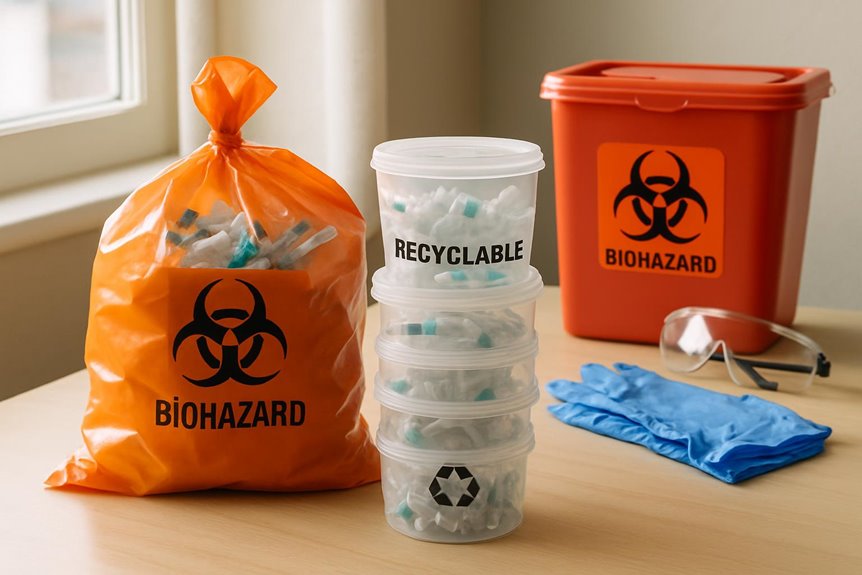Biohazard waste disposal can be costly and complex, presenting challenges for individuals and businesses alike. Nevertheless, there are budget-friendly options available that prioritize safety and compliance. Local health departments often provide accessible programs, while community initiatives can offer practical solutions. Understanding these resources is vital for anyone looking to manage biohazard waste responsibly. What strategies can be employed to guarantee effective and economical disposal?
Key Takeaways
- Utilize community cleanup events or hazardous waste collection days for free or low-cost biohazard waste disposal options.
- Partner with local nonprofits that offer affordable disposal solutions and promote community health initiatives.
- Research local health department guidelines for biohazard disposal programs that may provide budget-friendly options.
- Consider DIY disposal methods using leak-proof containers and local disposal events to minimize costs.
- Gather multiple quotes from professional service providers to find the most cost-effective biohazard disposal services.
Understanding Biohazard Waste and Its Risks
Although many may not realize it, biohazard waste poses significant risks to both public health and the environment. Proper biohazard identification is essential in recognizing materials that can lead to serious health risks, such as infections, toxic exposures, and environmental contamination. Additionally, expert biohazard cleanup can mitigate these risks effectively.
This type of waste often includes medical refuse, chemicals, and other hazardous substances that, if mishandled, can affect not only those directly involved but also the wider community. Understanding the nature of biohazard waste empowers individuals and organizations to take necessary precautions. Biohazard cleanup services are crucial in ensuring that these materials are handled and disposed of safely.
Awareness of its potential dangers fosters a culture of responsibility, promoting safer practices and informed decision-making. By acknowledging these risks, one can advocate for better handling and disposal methods that ultimately safeguard public health and preserve ecological integrity.
Safe and Affordable Disposal Methods
When seeking safe and affordable disposal methods for biohazard waste, individuals and organizations can explore a range of practical options that adhere to regulatory standards.
One effective approach is affordable incineration, which safely reduces waste volume while neutralizing harmful pathogens. This method is often cost-efficient and can be accessed through specialized service providers.
Additionally, utilizing eco-friendly packaging for transporting biohazard materials not only guarantees compliance but also promotes environmentally responsible practices. Such packaging materials are designed to safely contain hazardous items, minimizing risks during transit.
Local Health Department Resources
Local health departments serve as invaluable resources for individuals and organizations seeking guidance on biohazard waste disposal. They provide essential information regarding health department guidelines and local regulations, ensuring safe practices that protect public health. Many departments also offer educational materials and disposal program details, facilitating compliant waste management.
| Resource Type |
Description |
Contact Information |
| Guidelines |
Comprehensive instructions on disposal methods |
[Local Health Department] |
| Disposal Programs |
Information on local disposal events and services |
[Contact Us] |
| Educational Materials |
Brochures and online resources for proper disposal |
[Website] |
Community cleanup events represent a valuable opportunity for residents to engage in biohazard disposal while contributing to local initiatives.
These events, often organized by local governments, encourage volunteer participation and foster a sense of community responsibility.
Local Government Initiatives
While many residents may not realize it, local government initiatives play an important role in promoting biohazard disposal through community cleanup events. These programs often collaborate with local organizations, creating effective community partnerships that encourage residents to participate in environmental stewardship.
By organizing events such as hazardous waste collection days, local governments provide accessible, budget-friendly solutions for safe biohazard disposal. These initiatives not only help to mitigate risks associated with improper disposal but also foster a sense of community responsibility. Effective sewage cleanup is essential during these events to ensure that all biohazard materials are handled safely.
Residents are empowered to engage in these efforts, contributing to cleaner neighborhoods and safer environments. Ultimately, government programs serve as a crucial resource, simplifying the disposal process and promoting public health while allowing citizens the freedom to take action.
Volunteer Group Participation
Numerous volunteer groups actively engage in community cleanup events, considerably enhancing the effectiveness of biohazard disposal efforts. These initiatives not only promote environmental health but also foster community spirit.
By participating, volunteers receive essential training, equipping them with knowledge about safe biohazard handling and disposal methods. This volunteer training is pivotal in ensuring that participants can manage potentially hazardous materials responsibly.
Additionally, community outreach efforts inform residents about the significance of proper biohazard disposal, encouraging wider participation and awareness. Such collaborative events redefine the approach to waste management, making it a collective responsibility.
Through volunteer involvement, communities can effectively reduce biohazard risks while empowering individuals to take proactive steps towards a safer, cleaner environment.
Partnering With Nonprofit Organizations
Partnering with nonprofit organizations can provide effective and economical solutions for biohazard disposal.
These collaborations often include donation and recycling programs that benefit the community while raising awareness about safe disposal practices.
Local Nonprofit Collaborations
Collaborating with local nonprofit organizations can provide an effective and budget-friendly solution for biohazard disposal.
Nonprofit partnerships often focus on community engagement, allowing businesses and individuals to contribute to local health initiatives. By teaming up with these organizations, disposal costs can be reduced as nonprofits may already have established protocols for handling biohazard materials safely and responsibly.
Additionally, such collaborations can enhance community awareness about biohazard issues, fostering a shared sense of responsibility. This approach not only supports the crucial work of nonprofits but also encourages a collective effort towards maintaining a safer environment.
Ultimately, engaging with local nonprofits can lead to innovative solutions that align with both ethical and financial objectives.
Donation and Recycling Programs
Building on the engagement fostered through local nonprofit collaborations, donation and recycling programs present another viable avenue for biohazard disposal.
Many nonprofits offer donation opportunities for unused medical supplies and equipment, which can greatly reduce waste while benefiting communities in need. These organizations often facilitate recycling initiatives aimed at repurposing materials that would otherwise contribute to environmental harm.
By partnering with nonprofits, individuals and businesses can responsibly dispose of biohazardous items while supporting worthy causes. This approach not only fosters community engagement but also promotes a sustainable ethos, empowering people to make informed choices about their waste.
Ultimately, donation and recycling programs provide a practical solution that safeguards both health and the environment.
While raising awareness about biohazard disposal may seem intimidating, community awareness initiatives can greatly enhance public understanding when nonprofits are involved.
Partnering with these organizations fosters community education and promotes effective awareness campaigns.
- Workshops: Nonprofits can host workshops to educate the community about safe biohazard disposal practices.
- Information Drives: Distributing pamphlets and resources helps residents understand the importance of proper disposal methods.
- Collaborative Events: Organizing community clean-up events encourages participation and offers hands-on experience in responsible disposal.
DIY Biohazard Disposal Techniques
Managing biohazard waste at home can seem challenging, but with the right DIY techniques, it becomes a manageable task.
To guarantee home safety, individuals can start by using sturdy, leak-proof containers to collect items like sharps or contaminated materials. It’s essential to label these containers clearly to avoid accidents.
For liquid waste, mixing it with absorbent materials—like cat litter—can facilitate safe disposal in regular trash, adhering to local waste management guidelines.
Additionally, individuals can research local disposal events for hazardous materials, which often offer safe and cost-free options. Implementing proper biohazard cleanup techniques can significantly reduce the risk of contamination and ensure a safer home environment.
These DIY techniques empower homeowners to take control of their biohazard waste while maintaining a safe living environment. Embracing these practices fosters both responsibility and freedom in managing household waste.
Finding Cost-Effective Professional Services
How can individuals find affordable professional services for biohazard disposal without compromising on safety? The key lies in thorough research and smart decision-making.
- Cost Comparison: Gather quotes from multiple providers to identify the most competitive pricing. Ascertain that all quotes include the same services for an accurate comparison.
- Service Reviews: Read customer reviews and testimonials to gauge the reliability and quality of services offered by different companies.
- Certifications: Verify that the service providers are certified and compliant with local regulations, guaranteeing safety without overspending. Additionally, consider reaching out to companies that specialize in suicide cleanup services as they often have the expertise required for sensitive biohazard situations.
Frequently Asked Questions
What Types of Materials Are Considered Biohazard Waste?
Biohazard waste encompasses various materials, including medical waste such as contaminated sharps, bodily fluids, and infectious tissues. These hazardous materials require careful handling and disposal to guarantee safety and protect public health and the environment.
Can I Dispose of Biohazard Waste in Regular Trash?
Disposing of biohazard waste in regular trash is prohibited by biohazard regulations. Proper waste management practices must be followed to guarantee safety and compliance, protecting public health and the environment from potential hazards associated with improper disposal.
Are There Penalties for Improper Biohazard Disposal?
Penalties for improper biohazard disposal can be severe, including substantial fines and legal consequences. An overview of these penalties reveals the importance of adhering to regulations to guarantee safety and avoid costly mistakes.
How Can I Identify a Reputable Disposal Service?
To identify a reputable disposal service, one should seek certification verification and examine customer reviews. A thorough research process guarantees the service meets safety standards, fostering peace of mind while managing biohazard materials responsibly.
What Should I Do in Case of a Biohazard Spill?
In case of a biohazard spill, immediate spill response is essential. Isolate the area, notify authorities, and guarantee safety gear is worn. Emergency cleanup should follow established protocols to prevent further contamination and protect public health.
Conclusion
In conclusion, exploring budget-friendly biohazard disposal options is essential for ensuring safety and environmental responsibility. Local health departments, community cleanup events, and nonprofit partnerships offer accessible solutions that often come at little to no cost. Additionally, DIY techniques and careful research into professional services can lead to affordable yet compliant disposal methods. By utilizing these resources, individuals and organizations can effectively manage biohazard waste while minimizing expenses and promoting community well-being.

